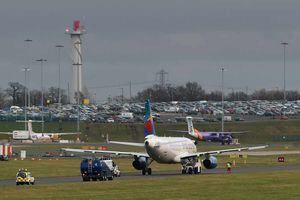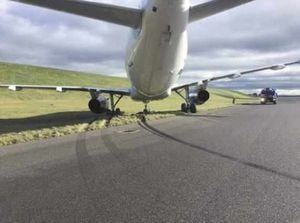Birmingham Airport plane was going too fast when it skidded off runway
An aeroplane which ran off the tarmac at Birmingham Airport with 105 people on board was travelling nearly twice as fast as it should have been, an investigation has concluded.

The Airbus A320-233, operated by Lithuanian-based airline Small Planet, had flown in from Paderborn in Germany on the morning of February 21.
But shortly after landing the aircraft failed to make a right-angle turn and skidded on to the grass.
The six crew members and 99 passengers on board were uninjured in the incident although there was disruption to other aircraft because the section of the 'taxiway' was unusable while the plane was stranded.
The Air Accidents Investigation Branch (AAIB) has now published its findings on what happened and concluded that the flight crew may have become too relaxed after safely negotiating a difficult landing under conditions described as 'gusty' and 'turbulent'.
Flight crew manuals state that the aeroplane should have been travelling no faster than 10 knots (11.5mph) when making the turn but the AAIB report has revealed it was going 18 knots (20.7mph) when starting to negotiate the bend.
It was still travelling 13 knots (14.9mph) when the nose-wheel left the runway.

Following the incident, the cockpit voice recorder picked up the commander asking the first officer 'what was our speed?' to which he replied he did not know because he was carrying out other after-landing actions.
The report also confirmed the section of the tarmac where the plane ran off was damp following showers earlier that morning.
The AAIB report stated: "The aircraft's speed (18 kt) was considerably higher than that given in the aircraft operating procedures (less than 10 kt) for a 90° turn.
"The procedures do not necessarily take into account degradation in friction qualities such as could be experienced on a damp surface, so it is arguable that an even lower speed might have been prudent. "Given the relatively high speed that the turn was entered, it is probable that nose-wheel steering angle was increased rapidly to maximum, and that this contributed to the early skid."
It added: "From the flight crew accounts, the cockpit voice recorder data and the lack of significant wheel braking, it is clear that the flight crew did not appreciate that the aircraft's speed was too high for the
90° turn.
"The commander did not recall any distractions immediately beforehand, although it is possible that his attention may have been diverted briefly: to refer to a taxi chart, or to monitor the first officer's actions, for example.
"The first officer's primary role at the time would have been to monitor the aircraft to ensure a safe taxi, and his attention was diverted from this task by performing the after-landing actions at that time.
"There would have been no particular urgency to these actions, which could have been delayed until the aircraft was safely on Taxiway Alpha.
"The difficult approach and landing offers a possible explanation as to why the experienced crew attempted the turn at too high a speed.
"Landing safely after a period of intense high workload, it is possible that the crew inadvertently but prematurely relaxed their normal level of vigilance."
Birmingham Airport's tower controller initiated an 'Aircraft Ground Incident' which saw the airport's rescue service rush to the scene.
All of the passengers were safely disembarked from the rear of the plane.
Small Planet Airlines apologised for the inconvenience caused at the time.





